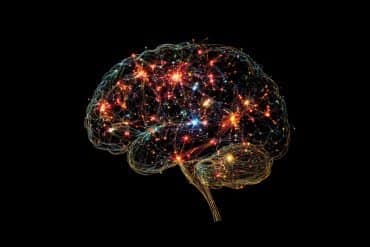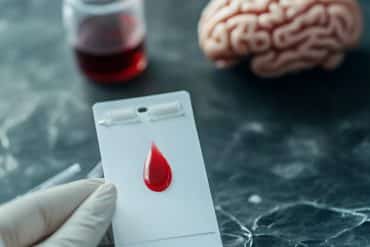Summary: According to researchers, some anti-epileptics drugs may also induce psychosis in some patients.
Source: Oxford University Press.
Today Brain publishes a new study indicating that antiepileptic drugs designed to reduce seizures, may also induce psychotic disorders in some patients.
Epilepsy is one of the most common neurological disorders. People with epilepsy have increased vulnerability to psychiatric problems.
However, it is also possible that the drugs used by patients to control their seizures may increase the risk of psychotic symptoms in certain people.
To test this possibility, researchers screened the medical records of 2630 patients with epilepsy and identified 98 (3.7%) with psychotic disorders. Among these, 14 (14.3%) were diagnosed as having a psychotic disorder that had been triggered by their antiepileptic drugs. Ten of the patients in the antiepileptic drug-induced psychosis group were female, and ten had a type of epilepsy called temporal lobe epilepsy.

The researchers determined that, among epilepsy patients with psychotic disorders, one in seven could potentially be attributed to antiepileptic drugs. Women and those with temporal lobe epilepsy seem to be more likely to develop psychological problems in response to antiepileptic medication.
Funding: The study was funded by Australian and New Zealand Association of Neurologists Bayer Asia Pacific Region Neurology Educational Grant.
Source: Daniel Luzer – Oxford University Press
Image Source: This NeuroscienceNews.com image is in the public domain.
Original Research: Abstract for “Psychotic disorders induced by antiepileptic drugs in people with epilepsy” by Ziyi Chen, Ana Lusicic, Terence J. O’Brien, Dennis Velakoulis, Sophia J. Adams, and Patrick Kwan in Brain. Published online August 8 2016 doi:10.1093/brain/aww196
[cbtabs][cbtab title=”MLA”]Oxford University Press. “Some Psychotic Disorders May Be Induced by Drugs Designed to Combat Epilepsy’s Effects.” NeuroscienceNews. NeuroscienceNews, 8 August 2016.
<https://neurosciencenews.com/epilepsy-drugs-psychosis-4806/>.[/cbtab][cbtab title=”APA”]Oxford University Press. (2016, August 8). Some Psychotic Disorders May Be Induced by Drugs Designed to Combat Epilepsy’s Effects. NeuroscienceNew. Retrieved August 8, 2016 from https://neurosciencenews.com/epilepsy-drugs-psychosis-4806/[/cbtab][cbtab title=”Chicago”]Oxford University Press. “Some Psychotic Disorders May Be Induced by Drugs Designed to Combat Epilepsy’s Effects.” https://neurosciencenews.com/epilepsy-drugs-psychosis-4806/ (accessed August 8, 2016).[/cbtab][/cbtabs]
Abstract
Psychotic disorders induced by antiepileptic drugs in people with epilepsy
Antiepileptic drug treatment can induce psychosis in some patients. However, there are no agreed definitions or diagnostic criteria for antiepileptic drug-induced psychotic disorder in the classification systems of either epileptology or psychiatry. In this study we investigated the clinical spectrum of antiepileptic drug-induced psychotic disorder in patients with epilepsy. The medical records of all patients with epilepsy who were diagnosed by a neuropsychiatrist as having a psychotic disorder at the Royal Melbourne Hospital from January 1993 to June 2015 were reviewed. Data were extracted regarding epilepsy and its treatment, psychotic symptoms profile and outcome. The diagnosis of epilepsy was established in accordance to the classification system of the International League Against Epilepsy while that of psychotic disorder was made according to the Diagnostic and Statistical Manual of Mental Disorders, 5th Edition and the proposal on neuropsychiatric disorders in epilepsy. Patients with antiepileptic drug-induced psychotic disorder were compared to those with psychotic disorders unrelated to antiepileptic drugs assessed over the same period (non-antiepileptic drug induced psychotic disorder group). Univariate comparisons were performed and variables with a value of P < 0.1 were selected for the multivariate logistic regression analysis. The records of 2630 in-patients and outpatients with epilepsy were screened, from which 98 (3.7%) with psychotic disorders were identified. Among these, 14 (14.3%) were diagnosed to have antiepileptic drug-induced psychotic disorder. Excluding one patient who developed psychosis after valproate withdrawal, 76.9% in the non-antiepileptic drug induced psychotic disorder group were female and the percentage of temporal lobe involvement was higher in the non-antiepileptic drug induced psychotic disorder group (69.2% versus 38.1%, P < 0.05). Current use of levetiracetam was higher in antiepileptic drug-induced psychotic disorder group (84.6% versus 20.2%, P < 0.01) while use of carbamazepine was higher in the comparator group (15.4% versus 44.0%, P < 0.05). Multivariate logistic regression confirmed four factors associated with antiepileptic drug-induced psychotic disorder: female gender, temporal lobe involvement and use of levetiracetam, and a negative association with carbamazepine. Disorganized behaviours and thinking were more common in the antiepileptic drug-induced psychotic disorder group (100% versus 72.6% and 76.9% versus 38.1%, respectively; P < 0.05). The percentage of continuous treatment with antipsychotic drugs was lower in the antiepileptic drug-induced psychotic disorder group (15.4% versus 66.7%, P < 0.01). No patients experienced a chronic course in antiepileptic drug-induced psychotic disorder group whereas 40.5% did in non-antiepileptic drug induced psychotic disorder (P < 0.05). Our findings indicated that one in seven patients with epilepsy who developed psychosis had antiepileptic drug-induced psychotic disorder. In these patients, female gender, temporal lobe involvement and current use of levetiracetam were significantly associated with antiepileptic drug induced psychotic disorder compared to other types of psychosis, while carbamazepine had a negative association. Disorganized behaviours and thinking were predominant in antiepileptic drug-induced psychotic disorder. Patients with antiepileptic drug-induced psychotic disorder differed from non-antiepileptic drug-induced psychotic disorders in having better outcome.
“Psychotic disorders induced by antiepileptic drugs in people with epilepsy” by Ziyi Chen, Ana Lusicic, Terence J. O’Brien, Dennis Velakoulis, Sophia J. Adams, and Patrick Kwan in Brain. Published online August 8 2016 doi:10.1093/brain/aww196







